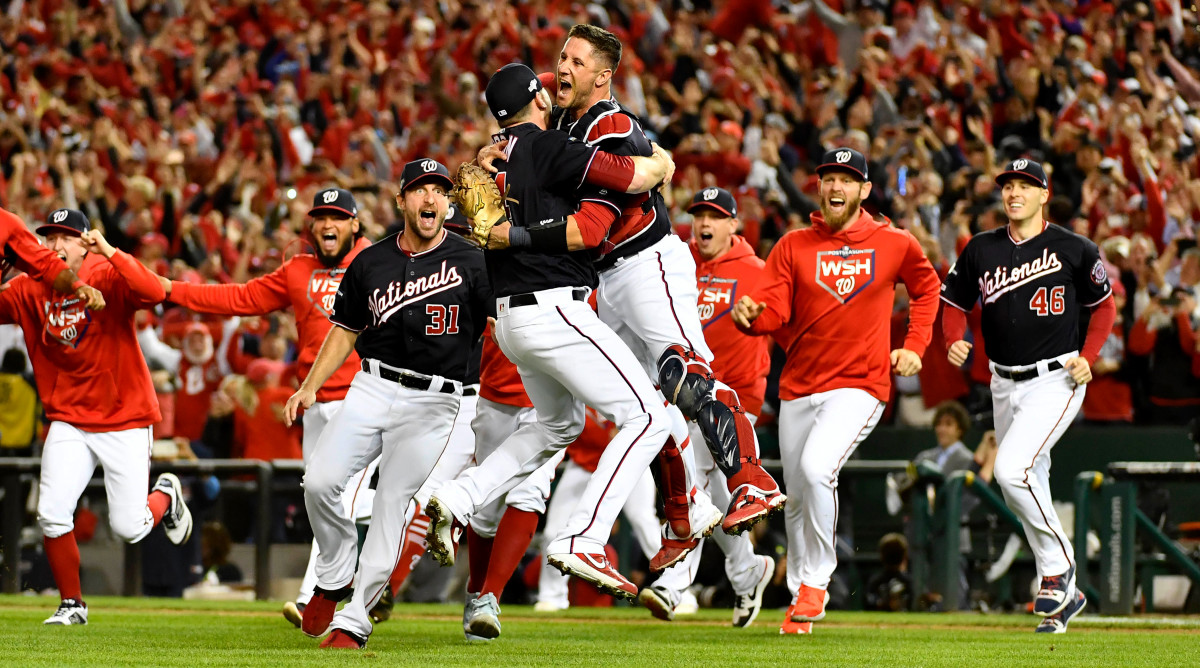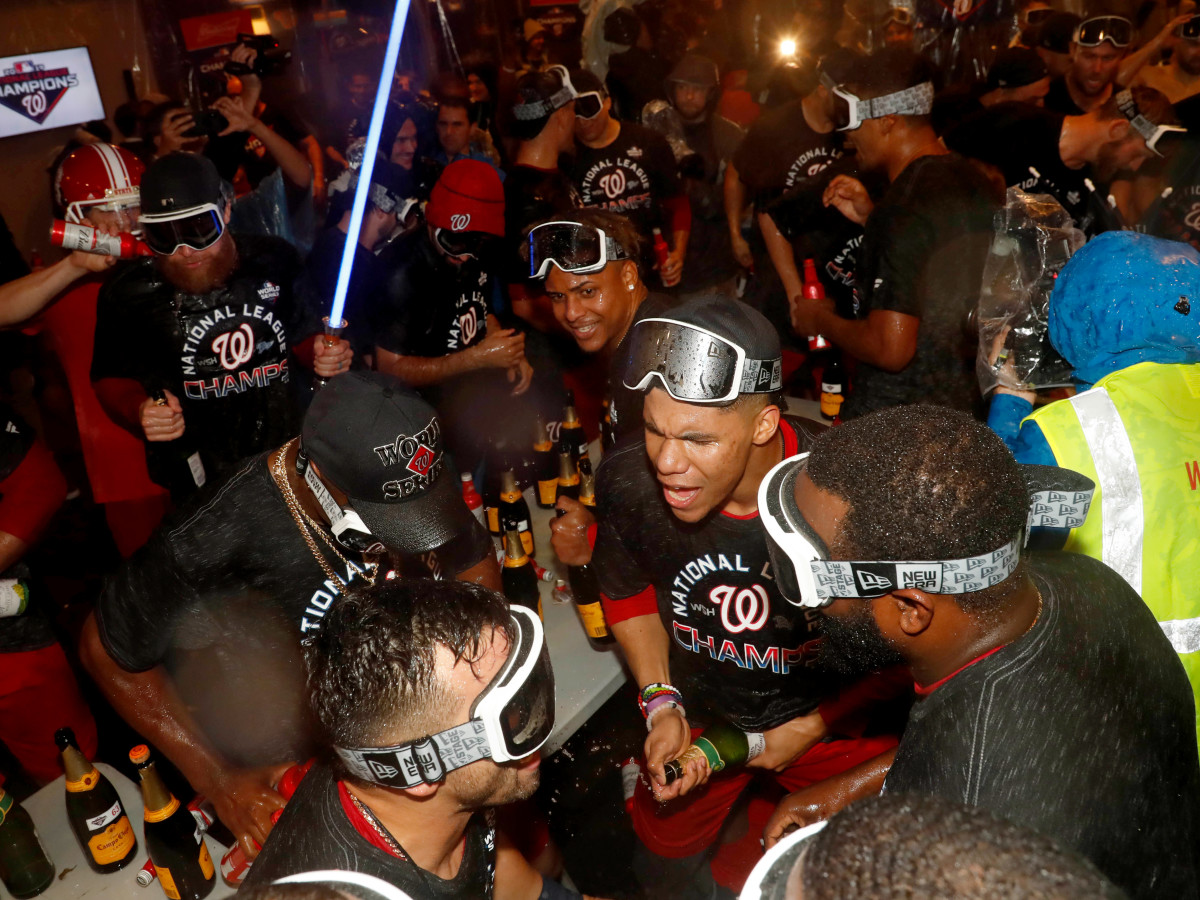Nationals Treasure: After Years of Heartbreak, Washington Has Won the National League


WASHINGTON — In the top of the ninth—after one out had been recorded but before the final two, when victory was so close as to seem material but so far as to feel untouchable—the home crowd broke out in a disjointed cheer. Let’s – Go – Nats.
It was the same chant that this park has done since its conception, in the same rhythm that any of these chants has taken forever, and yet the crowd could not coalesce onto one beat. There was no prompt from the scoreboard to guide them. There was only energy. But there was too much spilling over—there was too much, period—and so the emotion pulsed and bled into one great wave of loosely distinct noise, 43,976 people giving individual voice to a collective statement of faith.
Victory materialized. A flyball, deep to center, nestled in the glove of Victor Robles. The Washington Nationals were going to the World Series.
The Nationals’ 7-4 win in Game 4 of the NLCS was not as crisp as those from Games 1 to 3. They did, finally, allow more than one run to the St. Louis Cardinals, and despite an explosive first inning that provided all the offense they needed, they still allowed the game to get a bit too close for comfort. But it was a win all the same, an exultant conclusion to a sweep that bucked all team narratives.
After an established tradition of frustration against all odds, with four first-round exits in six years—some heartbreaking and some, frankly, bizarre—they’d gone further than they ever had before, and they’d done so in a fashion totally anomalous to the franchise. This NLCS did not swing on close calls or missed chances or baffling strategy. While there was tension, there was no drama, for there was no real suspense. Instead, there was simply dominance. The Nationals didn’t trail for so much as an inning. It all ran completely counter to the franchise’s previous postseason experience. And so it was only fitting that it took them somewhere they’d never been before.
After a month of celebrations that had marked wild wins from behind—clinching a postseason spot after having been left for dead by May, taking the wild-card game after being down to their final six outs, getting the division series on a comeback slam in extras—the team could finally celebrate a series in which they’d only ever been ahead.
“You ever seen Stephen Strasburg dance?” Dave Martinez had cracked before Game 4, talking about how his entire squad, even the mild-mannered pitcher, had embraced the club’s loose vibe. “It’ll make you laugh. Make you have fun. I’m not saying he’s a bad dancer. He’s actually getting a lot better.”
In the clubhouse, Strasburg danced. A decade after he’d been drafted, seven years after he’d been held out of the postseason with the belief that he’d one day instead be able to contribute to some better future, a day after he’d won the game that gave them the chance to be here now, Strasburg grabbed Gerardo Parra and waltzed around the room, teammates spraying beer in their direction with abandon.

Sean Doolittle wielded a lightsaber. Trea Turner donned a helmet with the emblem of his alma mater, N.C. State, to dive into the fracas. Naturally, 20-year-old Juan Soto enjoyed some sparkling grape juice. (He’ll turn 21 on October 25—Game 3 of the World Series, which will be, no matter the team’s opponent, the first Fall Classic home contest in Washington, D.C., since 1933.) Max Scherzer drank from the trophy. This time, they were not celebrating the end of historic franchise misfortune, the realization of a win that had seemed out of reach or the sheer marvel of existence in October. They were simply celebrating themselves.
It is going to be a looooong night for the Nats
— SI MLB (@si_mlb) October 16, 2019
(via @Britt_Ghiroli /The Athletic) pic.twitter.com/509tCxy9Tm
Elder statesman Ryan Zimmerman was the first to switch to Bud Light while his teammates continued to chug Budweiser. (Veteran wisdom.) The Original Nat—there from the start, in a career that has spanned the stretch of the franchise’s existence in D.C., an individual avatar for all of that institutional growth and endurance and success—had spent the series fielding texts from old teammates who’d never gotten to be there. “Those guys took care of me like I’ve got to take care of these young guys now,” he said.
It loosely matched what Martinez had said in the team’s initial moment of celebration, on the infield in front of the fans, before they’d retreated to the beer-soaked intimacy of the clubhouse.
“Sometimes, bumpy roads lead to beautiful places,” the skipper had declared, surrounded by his players, looking out at the crowd in front of them. “And this is a beautiful place.”
When Martinez was finished speaking—as players drifted out to embrace their families, children in their fathers’ jerseys swirling their feet in the infield dirt, people crying and laughing and taking pictures—the stadium’s speaker system dared to briefly look ahead: “The Best Is Yet to Come.”
